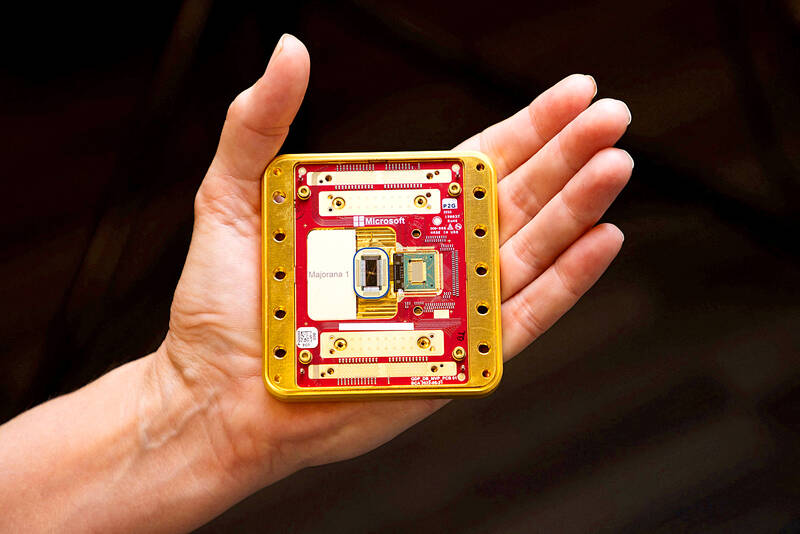Microsoft Corp on Wednesday unveiled a new computer chip that it says could transform everything from fighting pollution to developing new medicines, joining Google and IBM Corp in arguing that the promise of quantum computing is closer to reality.
The US-made chip, called Majorana 1, can fit in the palm of a hand, but packs a revolutionary design that Microsoft believes would solve one of the biggest challenges in quantum computing — making these super-powerful machines reliable enough for real-world use.
“We took a fresh approach and basically reinvented how quantum computers could work,” Microsoft senior scientist Chetan Nayak said.

Photo courtesy of Microsoft Corp via Reuters
The company said its breakthrough was confirmed in research published on Wednesday in the scientific journal Nature.
The new Majorana 1 chip uses a special approach to building quantum computers that could make them more stable and easier to scale up than the work done by Google or IBM, which are considered leaders in the field.
While the chip represents a major advance, Microsoft acknowledges that more engineering work lies ahead before quantum computers become practical tools. However, the company said the breakthrough could make that reality possible within “years rather than decades.”
Nvidia Corp chief executive officer Jensen Huang (黃仁勳) last month said that quantum technology was two decades away from overtaking his company’s chips, the workhorses of artificial intelligence (AI).
Google has said that commercial quantum computing applications are only five years away, while IBM expects large-scale quantum computers to be online by 2033.
Unlike regular computers that process information as 1s and 0s, quantum computers harness the strange properties of atomic particles, measured as qubits, to potentially solve problems that would take today’s most powerful supercomputers thousands of years.
Separately, Nvidia and research partners have created what they call the largest AI system yet for biological research, the company said on Wednesday, aiming to speed up breakthroughs in medicine and genetics.
The new AI system, called Evo 2, can read and design genetic code across all forms of life. Scientists have high hopes that such AI technology would dramatically accelerate research by spotting patterns in vast amounts of data that would normally take years to analyze by hand.
The model was built using 2,000 Nvidia H100 processors on Amazon.com Inc’s cloud infrastructure.
Developed with the Arc Institute and Stanford University, Evo 2 is now freely available to scientists worldwide through Nvidia’s BioNeMo research platform.
Beyond medicine, researchers believe the technology could help create crops that better withstand climate change and develop new ways to break down pollution.

To many, Tatu City on the outskirts of Nairobi looks like a success. The first city entirely built by a private company to be operational in east Africa, with about 25,000 people living and working there, it accounts for about two-thirds of all foreign investment in Kenya. Its low-tax status has attracted more than 100 businesses including Heineken, coffee brand Dormans, and the biggest call-center and cold-chain transport firms in the region. However, to some local politicians, Tatu City has looked more like a target for extortion. A parade of governors have demanded land worth millions of dollars in exchange

An Indonesian animated movie is smashing regional box office records and could be set for wider success as it prepares to open beyond the Southeast Asian archipelago’s silver screens. Jumbo — a film based on the adventures of main character, Don, a large orphaned Indonesian boy facing bullying at school — last month became the highest-grossing Southeast Asian animated film, raking in more than US$8 million. Released at the end of March to coincide with the Eid holidays after the Islamic fasting month of Ramadan, the movie has hit 8 million ticket sales, the third-highest in Indonesian cinema history, Film

Taiwan Semiconductor Manufacturing Co’s (TSMC, 台積電) revenue jumped 48 percent last month, underscoring how electronics firms scrambled to acquire essential components before global tariffs took effect. The main chipmaker for Apple Inc and Nvidia Corp reported monthly sales of NT$349.6 billion (US$11.6 billion). That compares with the average analysts’ estimate for a 38 percent rise in second-quarter revenue. US President Donald Trump’s trade war is prompting economists to retool GDP forecasts worldwide, casting doubt over the outlook for everything from iPhone demand to computing and datacenter construction. However, TSMC — a barometer for global tech spending given its central role in the

Alchip Technologies Ltd (世芯), an application-specific integrated circuit (ASIC) designer specializing in server chips, expects revenue to decline this year due to sagging demand for 5-nanometer artificial intelligence (AI) chips from a North America-based major customer, a company executive said yesterday. That would be the first contraction in revenue for Alchip as it has been enjoying strong revenue growth over the past few years, benefiting from cloud-service providers’ moves to reduce dependence on Nvidia Corp’s expensive AI chips by building their own AI accelerator by outsourcing chip design. The 5-nanometer chip was supposed to be a new growth engine as the lifecycle